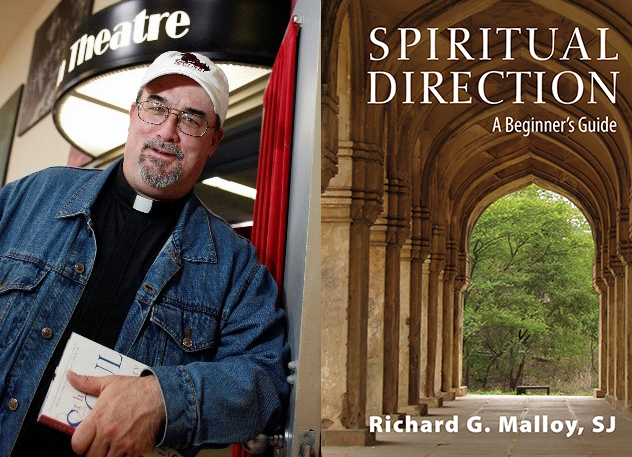In his introduction to his latest book “Spiritual Direction: A Beginner’s Guide,” (Orbis, 205 pp) Father Richard “Rick” Malloy, SJ, writes a jokester once stated God wants us to be “the person my dog thinks I am.”
On a more serious note he adds, “God wants us to be ourselves, the persons we deeply desire to be,” and as a longtime spiritual director, the priest combines both humorous and serious anecdotes to show just how spiritual direction can help individuals become just that.
However, he acknowledges that in our current confused era, finding spiritual direction can be a daunting task.
“To be an adult follower of Jesus the Christ in the twenty-first century means that one needs to be making a multitude of choices, often with little guidance,” he writes. Nonetheless, the Catholic Church, and particularly his own religious congregation, has a wealth of wisdom to share with folks, including people who aren’t Catholic, about how to get in touch with one’s soul and one’s God. Father Malloy’s book received an Honorable Mention Award this year in the Catholic Press Association’s category of Popular Presentation of the Catholic Faith.
Invoking Ignatius
“Spiritual Direction” includes a section on the Spiritual Exercises of St. Ignatius of Loyola, the Jesuits’ founder. Father Malloy spends considerable time writing about the Examen, which he calls “one of the simplest forms of prayer,” and “life-changing.”
The Examen consists of five P’s as follows:
Presence: “Stop. Breathe. Be here now,” Father Malloy writes. “Let the sense of the nearness and closeness of God settle into your consciousness.”
Praise: It’s important not to just thank God for all he has done for you, but to praise him, Father Malloy writes. Too often we take for granted God’s gift to us, which include our lives and time itself, he writes.
“Just taking time once or twice a day to praise the God who makes our lives possible and pleasant is a practice that maintains sanity and perspective,” Father Malloy writes.
Process: “Ignatian Spirituality is a method of weighing and making choices,” Father Malloy writes, adding it’s important for folks to examine their thoughts, good and bad, and ask for God’s help in directing them. We need to ask ourselves if our minds indulge too much lust, animosity and worry, among other tendencies.
“Being aware of such dynamics in our inner lives can make us pause, ask God for help, and resist the directions such thoughts take us,” he writes.
Penance: If you know you need to change direction in your life, penance can be a means to do so. For example, if you’re spending too much money on expensive beverages, try taking some of what you would spend and giving it to charity, Father Malloy writes.
“Penance is not an exercise in beating up on myself for all my faults and failures,” he writes. “Real repentance is like coaching. Corrections help me play the game better.”
Promise: Name and Claim: Identify the good things and improvements happening in your life, whether you’re increasing your Mass attendance or joining your local neighborhood watch to improve community safety. Positive actions you take are signs God is working in your life to make you a better person, he writes.
Looking for directions
In an interview about his book, Father Malloy advised Catholics to avail themselves of the extensive information their diocese likely has on retreat centers, as well as spiritual direction, and to explore the many online resources now available about Catholic spirituality.
In a refreshing departure from the polarization of the “Right” and “Left” which afflicts not only politics but the Church today as well, his book includes positive insights about the traditional Catholic network EWTN and Mother Teresa as well as liberal heroes like Sister Helen Prejean, the anti-death penalty activist, and antiwar activist Father Daniel Berrigan. It’s heartening to realize there are still Catholics like Father Malloy who refuse to dismiss the insights of others simply because they focus on different aspects of the faith, and it’s clear he believes the best Catholic spiritual direction aims at both personal holiness as well as societal transformation.
The University of Scranton chaplain sums up his position on spiritual direction and the need for all Catholics to seek guidance on how to relate to both God and neighbor succinctly.
“We need each other,” he says, “to bounce things off of one another.”
Rob Cullivan is a freelance writer living in Portland, Oregon. He has written for Catholic News Service and other religious and secular publications.
Start your day with Always Forward, our award-winning e-newsletter. Get this smart, handpicked selection of the day’s top news, analysis and opinion, delivered to your inbox. Sign up absolutely free today!

